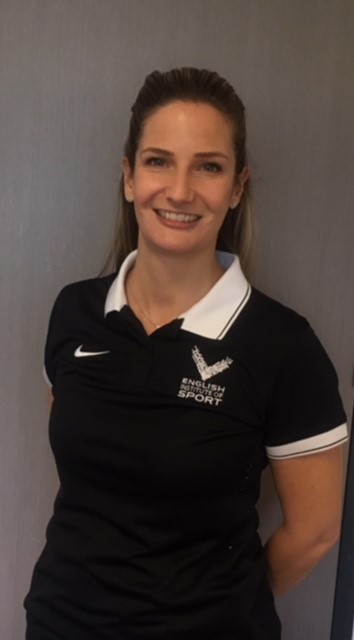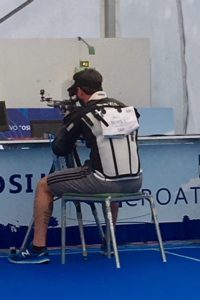An insight into the psychology support behind Britain’s Para-Shooting team
After September’s World Shooting Para Sport World Cup in Croatia, where Britain’s James Bevis won gold in the R9 event, we spoke to EIS para-shooting psychologist Sascha Haans to gain some insight into the psychology behind the sport.

“Shooting is like a mental marathon,” said Sascha. “The longer you can concentrate the better you shoot. In a game there is 50 minutes in which you have to release 60 shots so every shot needs to be perfect. The moment you lose your concentration or you focus on the wrong items it can alter your aim and your position in the standings. Just one bad shot can cause your performance to collapse and drop you down to a lower position.
“The issues I address as a psychologist are helping the athletes to stay focused and control their concentration during the 50-minute match. When you get in to the final it’s a totally different game as there are shoot outs with eliminations where you drop out of the race so there’s a whole different mentality to that side of it. One of the key elements as it’s such a high motor skills sport, is about holding the gun and having a strong postural balance and triggering your finger. The athletes need to train, have the right routine and have everything in place before they press the trigger.
“Balance, especially postural balance is a key element to performance and breathing is another technique that you can use to stay in the right mindset and help you concentrate. It’s all about where you place your attention, which things do you want to control and which things do you want to let go of during a shot? Triggering itself is a simple movement which needs perfecting – you don’t want to do it too quickly or too slow as this can change the position of the gun. It’s about finding the perfect comfort zone in your routine where you can do all those things building up to a shot.”
However, it is not only the focus and concentration of the athletes which Sascha works on, there is a physiological aspect to the performance and routine which she also has to address.
“Shooting performance also has a lot to do with heart rate. Sometimes your heart rate goes up, especially when it’s the final shot in the final; your heart rate can be difficult to control so it’s necessary to try to keep it as low as possible. We do a lot of training exercises where we pump up the heart rate before a shot in training so the athlete gets a feeling for what it’s like in competition. They do this by using breathing techniques, mindfulness exercises or concentration techniques to get into the zone and help reduce the heart rate.”
Sascha joined the EIS in April 2017 and describes her first major tournament away with the team back in September where they returned with a gold medal and explains why she loves working in Paralympic sport.
“For me it’s always satisfying to win and the gold medal won by James Bevis was in the R9 event, which is a new Paralympic event for Tokyo 2020 so James made history in that sense. It was a great achievement for para-shooting. However, I define successful tournaments more around the moments where athletes are learning and I see positive change where they do things differently for themselves.

“I always knew I wanted to work in Paralympic sport. There are so many different challenges working in Paralympic sport, understanding the athletes and their disabilities and the relationship with their disability and their psychological state – there is often a relationship between disability and the processes going on in the mind and understanding and researching that is a key element to my work.
“Also in regards to training load, how much the body can take and how much time certain athletes need to recover, this sort of information needs to be communicated to their coaches and that is a crucial part of my role. I act like a translator to help the coaches understand what the athlete’s capabilities are and help the athletes understand the professional attitude and perspective the coaches want from a psychological point of view. For me it’s about first understanding what type of disability the athlete has and then understanding any psychological issues that may be associated with that. A lot of my time is about getting to know the athletes very well and learning how they react when they are put in a performance environment under pressure.”
However, a career in sports psychology was not always on the cards for Sascha who took an interesting route to get to where she is now.
“I used to be a classical ballet dancer and then I got injured and went on to be a physical therapist. That job really intrigued me but as I studied physical therapy I also learnt about the mental side of rehabilitation in sports. I then decided I wanted to be a sports psychologist for a living and went on and did a Masters in Applied Sports Psychology.
“After Rio 2016 I applied for the EIS three-day workshop ‘Skills4Performance’ but they asked if I wanted to apply for the job with the para-shooting team. I live in the Netherlands and travel back and forth every two weeks to training camps. What I really appreciate about working at the EIS is that they really look out for their employees and when I first started my line manager proactively asked me how I wanted to develop myself and my knowledge while I was in the job.”